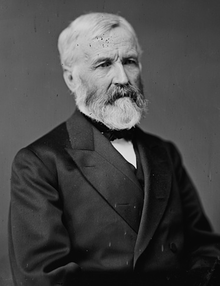Alexander Campbell (Illinois politician)

Alexander Campbell (October 4, 1814 – August 8, 1898) was an Illinois businessman, a member of the US House of Representatives, and a theorist of the Greenback movement.
Background
Cambell was born on a farm near Concord, Franklin County, Pennsylvania. He attended the public schools; became a clerk in an iron works and was subsequently promoted to superintendent, became wealthy managing mines and steel mills in Pennsylvania, Kentucky, and Missouri until 1850, when he moved to LaSalle, Illinois and became interested in the coal fields there.
Public office and political theory
He was the first mayor of LaSalle (1852–53) and served as a Republican member of the Illinois House of Representatives (1858–59).[1] He was a delegate to the 1862 Illinois Constitutional Convention.
In 1864, Campbell expanded on the ideas of pre-Civil-War U.S. economist Edward Kellogg in a book titled The True American System of Finance.[2] This was to make Campbell one of the leading figures in the evolving Greenback movement to replace bank currency with United States Notes in an effort to place labor on an equal footing with capital in the structure of finance. "Money creates no wealth," he wrote. "It only gathers up and appropriates to its owner things already produced."[3] He followed this up in 1868 with The True Greenback.[4]
He was elected as an independent to the Forty-fourth Congress from the Illinois' 7th congressional district, unseating Republican incumbent Franklin Corwin. He served from 1875–77, and sought re-election in 1876, but was defeated by Republican Philip C. Hayes.
After Congress
After his defeat, he never again held public office, although he issued pamphlets such as his 1878 Address to the voters of the seventh congressional district of Illinois.[5]
He was proposed at the 1880 national convention of the Greenback Party as the Greenback nominee for President of the United States (the convention chose James B. Weaver instead, although the "beloved" Campbell received 21 delegate votes).[6]
He died in LaSalle on August 8, 1898, and was buried in Oakwood Cemetery.
Footnotes
- ↑ "List of the members and officers, twenty-first General Assembly of the State of Illinois, Springfield, January 3, 1859" Springfield: Illinois. General Assembly (21st: 1858-1860)
- ↑ Campbell, Alexander. The True American System of Finance: The Rights of Labor and Capital, and the Common Sense Way of Doing Justice to the Soldiers and Their Families; No Banks, Greenbacks the Exclusive Currency. Chicago : Evening Journal Book and Job Print, 1864
- ↑ Rodgers, Daniel T. The Work Ethic in Industrial America, 1850-1920 Chicago: University of Chicago Press, 1979; p. 216
- ↑ Campbell, Alexander. The True Greenback: The Way to Pay the National Debt Without Taxes, and Emancipate Labor. Chicago : Printed at the Republican Book and Job Office, 1868
- ↑ Campbell, Alexander. Address to the voters of the seventh congressional district of Illinois. Chicago, Blakely, Brown & Marsh's, Printers, 1878
- ↑ Richardson, Darcy G. Others: Third Party Politics from the Nation's Founding to the Rise and Fall of the Greenback-Labor Party Bloomington, Indiana: iUniverse, 2004; Volume 1; pp. 510-512
Further reading
- Gretchen Ritter, Goldbugs and Greenbacks: The Antimonopoly Tradition and the Politics of Finance in America. New York: Cambridge University Press, 1997.
External links
- United States Congress. "Alexander Campbell (id: C000075)". Biographical Directory of the United States Congress.
| United States House of Representatives | ||
|---|---|---|
| Preceded by Franklin Corwin |
Member of the U.S. House of Representatives from Illinois's 7th congressional district 1875-1877 |
Succeeded by Philip C. Hayes |